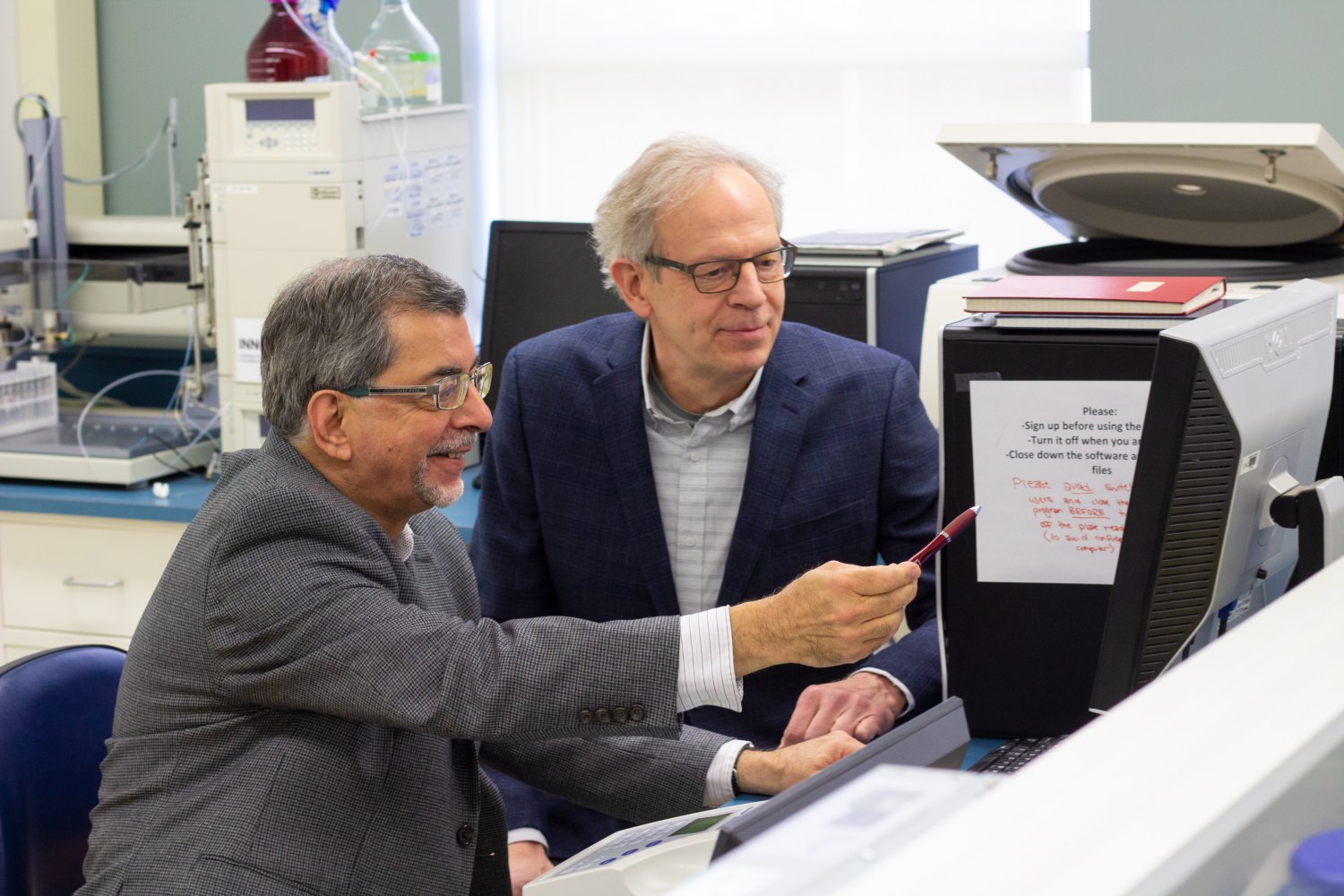
Researchers Roger Dixon (right) and Jack Jhamandas are among eight U of A scientists who make up New Synergies in Research on Alzheimer's Disease (SynAD). The group has received $1-million in funding to support promising young researchers in the field and dispense seed money to kick-start new investigations to unlock the Alzheimer's puzzle.
New funding to bolster greater collaboration among Alzheimer's disease and related dementia researchers (ADRD) at the University of Alberta is kindling hope for Canadians living with the degenerative brain disease.
The Hope for Tomorrow Dementia Research Catalyst Grant from the Alzheimer Society of Alberta and Northwest Territories provides a one-time $500,000 research support boost, matched by the University Hospital Foundation for a total $1-million commitment. The combined efforts of these two communities of donors are able to further advance a new collaboration of ADRD researchers at the U of A, known as New Synergies in Research on Alzheimer's Disease (SynAD).
The SynAD team is initially made up of eight top researchers who are members of the Neuroscience and Mental Health Institute (NMHI). The grant will provide urgently needed small equipment, support promising young researchers in the field and dispense seed money to kick-start new investigations to unlock the Alzheimer's puzzle.
"Thanks to the generous support of our donors, funding this research brings hope to those living with disease and highlights the importance of investing in quality research right here in Alberta," said Chris Lane, president of the Board of Directors, Alzheimer Society of Alberta and Northwest Territories.
Joyce Mallman Law, president of the University Hospital Foundation, agrees: "Dementia has such a devastating impact on patients, their families, and the community. We're inspired by the vision of the team at the University of Alberta to tackle this public health challenge. Because of tremendous support from our donors, the University Hospital Foundation was pleased to contribute $500,000 to enhance research in Alzheimer's Disease and Related Dementias."
According to the Alzheimer Society of Canada, ADRD is an urgent public health crisis. Currently more than half a million Canadians are living with dementia, but by 2031, this will rise to more than 900,000. Alzheimer's Disease is a complex disorder that develops slowly over time prior to diagnosis. Presently there are no disease-altering interventions available and there is no cure.
"Individuals with Alzheimer's Disease receive the diagnosis with dread," said Roger Dixon, SynAD team lead, Canada Research Chair in Cognition and Aging, professor of psychology at the U of A's Faculty of Science and a member of NMHI. "It's a very serious disease where they essentially have the feeling of self-loss. They lose their memory, they lose their family, they lose their identity and eventually they lose their life. It's a very serious concern."
Because of the difficulties in treating Alzheimer's, scientists are taking a multi-pronged approach in their research efforts. Dixon says the idea behind The Hope for Tomorrow Grant is to fund the SynAD team over a two-year period, "to help all boats float higher by enhancing research activity and achievement at the University of Alberta."
Dixon explains that scientists from multiple disciplines are shifting their efforts to examine the disease in its earliest manifestations prior to diagnosis to find early signals of the illness. There is also ongoing work to find medications that might alter the disease after diagnosis or even cure it.
The SynAD team at the U of A hopes to accelerate their efforts by supporting new researchers and organizing efforts under a common purpose. SynAD is also working to identify specific areas of need within the Neuroscience and Mental Health Institute and the ADRD research community in order to bridge those gaps and enhance local Alzheimer-related research.
"I think we will make a very important difference at the University of Alberta," said Dixon. "Two years is a very short time, so it may be a difference that is really recognized later as we see people and trainees who are improving their work and helping lead research into Alzheimer's Disease and Related Dementia in the future."